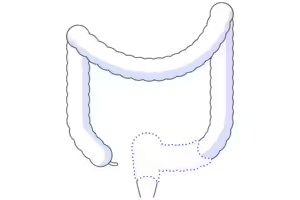
This is a draft post – will be updated as part of writing more about my journey.
My cancer surgery was an ultra-low anterior resection, combined with forming an ileostomy to give my colon time to recover. When I left the hospital after my resection surgery, I was provided a lot of information on diet, how to handle a stoma, etc. It was really useful. But when I left after the stoma reversal, there was much less information on what to expect. So I did my own research, and I thought I’d share what I learned (with references).
The first thing I learned, from a great video, from consultant Gastroenterologist Jervoise Andreyev (United Lincolnshire Hospitals NHS Trust) about regaining bowel control after bowel cancer treatment was that it takes 9-12 months for your bowel function to “get as good as its going to get” after surgery. That was really helpful to me in setting expectations on how fast I’d recover. My optimism can set unreasonable recovery expectations for me sometimes, and even now, I’m only 3 months in, so lots of room for improvement yet.
That video, and the article on Love Your Buns (a nonprofit focused on rectal cancer), about lower anterior resection, gave me a good summary of what to expect, and how to support myself with recovery.
What I experienced:
Very frequent, small, bowel movements – mine were 15x a day when I left hospital, and now after 3 months are averaging 5x a day.
Urgent bowel movements – needing to go to the toilet right now.
Clustering – many small bowel movements in a short period of time. E.g. 15 minutes apart.
Inability to control wind and soft bowel movements – this can mean small amounts of incontinence, and if I do get diarrhoea, I can’t control that either.
Sensitivity to food containing “high residue” – insoluble fibre – it makes the symptoms worse.
Things that helped:
Low residue diet: A nutritionist explained to me that low residue, soluble fibre can be mashed with a fork – while high residue fibre cant be. So the inside of a baked potato is low residue, but the skin in high revenue. High residue foods cause many, small bowel movements for me – they break up the stool, it seems. And seeds are also unpleasant coming out. So I avoid seeds and nuts, raw fruit and vegetables and leafy vegetables – and I eat more potatoes, pasta, cooked cereals etc. (Theres a good guide here: https://www.loveyourbuns.org/lars)
Fybogel: I take Fybogel with breakfast and dinner – that seems to encourage larger and less frequent bowel movements
Toilet stool: A toilet step or stool, to change my posture to more of a squatting one, means that I do larger bowel movements – it really helps reduce clustering.
Hand bidet: I started using a HappyPo squeeze-bottle portable bidet just to make it easier to stay clean without wiping too much, since wiping 15x a day got very painful. But I also found that the water stimulated more bowel movements, so it augments the benefit of the toilet stool – and its portable enough to carry with me.
Incontinence pads: Typically I only experience a little smearing etc, so a small “guard” type pad is enough. I use the Dailee Men level 2 pad. If Im worried about diarrhoea, or Im just going to be out a long time, I used the Attends F6 pad. (its also more comfortable sitting for a long time, eg on a plane)
Pelvic Floor Exercises: Dr. Jervoise Andreyev’s video said that pelvic floor exercises could really help with urgency and control. I was already doing these, but he suggested 10x a day for at least 2 weeks before you’d see results, so I started doing more. It helps, if you keep doing them.
Melatonin: It is suggested by Love Your Buns, but I found Melatonin can be useful if Im having a really bad day, and am worried about getting to sleep. It does seem to slow my bowels down within 20-30 minutes. And it helps me sleep too.
References:
- Bowel Cancer UK: Ask an Expert video with Dr Jervoise Andreyev
- Love Your Buns: Managing quality of life with LARS
- Coloplast: booklet on bowel function after rectal cancer surgery
- Sheffield Teaching Hospitals booklet on bowel function after colorectal cancer